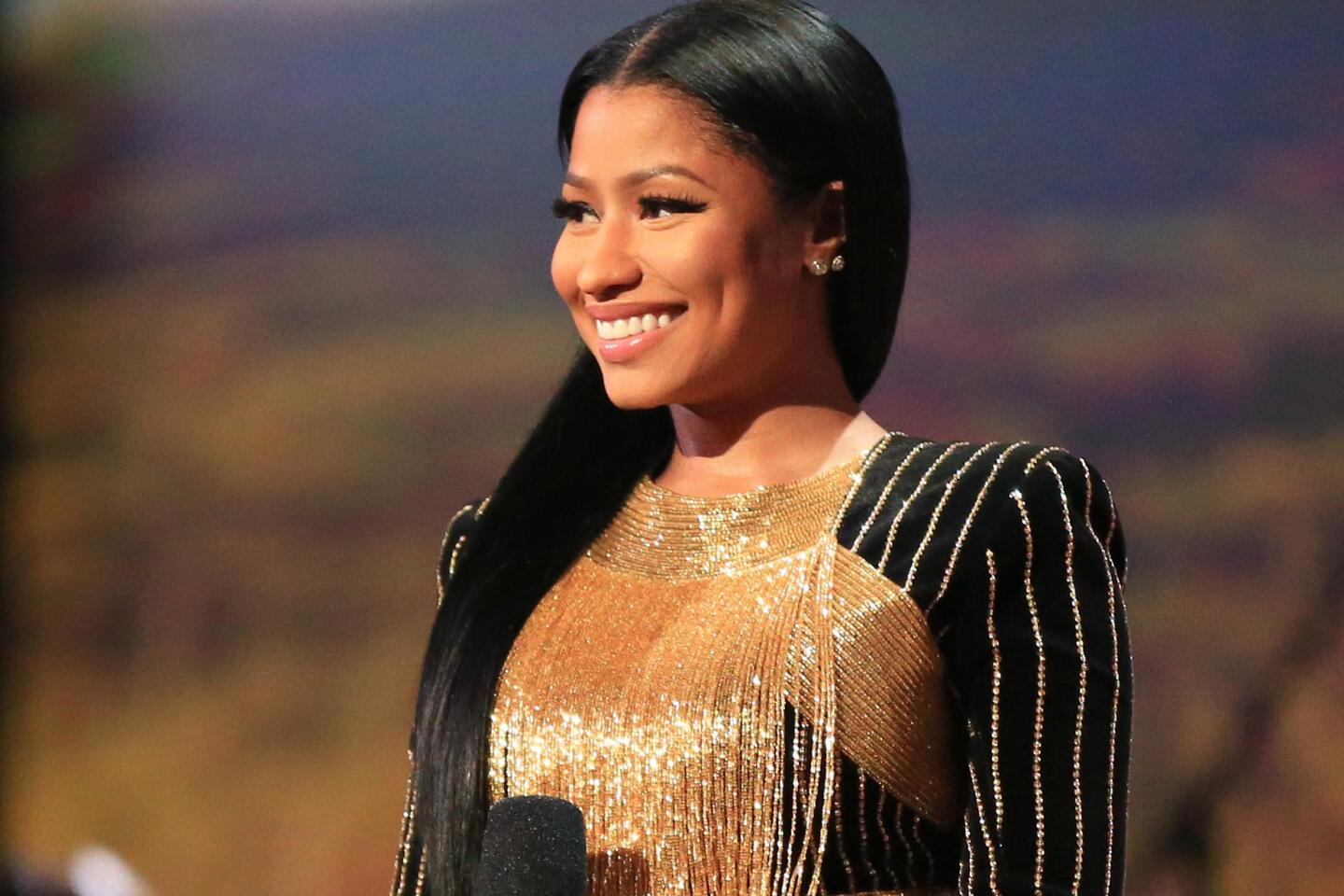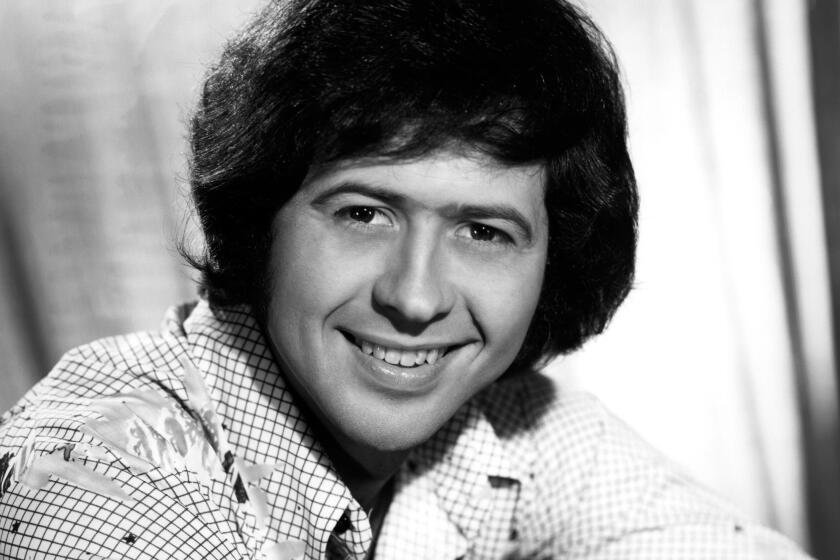Countdown: Flying Lotus and L.A.’s experimental music scene are poised to scoop up Grammys

Flying Lotus
- Share via
Flying Lotus is everywhere at this year’s Grammys, even when you can’t see him.
The L.A. producer, born Steven Ellison, is up for his first nomination as an artist, a best dance recording nod for his song “Never Catch Me.” That single, a hypnotic highlight from his well-received 2014 LP “You’re Dead!,” featured Kendrick Lamar on guest vocals. Ellison also contributed production work to Lamar’s album “To Pimp a Butterfly,” a politically charged and jazz-infused album considered a favorite to bring home top awards.
FULL COVERAGE: Grammy Awards 2016
Ellison was privy to the behind-the-scenes Grammy selection process as a member of the panel determining what records fit in the best alternative music album category. But as a boss of the label Brainfeeder, home to heavily buzzed saxophonist Kamasi Washington and a host of other L.A. artists, he also saw how cryptic the nominating process can be, when Washington’s acclaimed triple-LP “The Epic” was shut out of nominations in the jazz categories.
Five albums deep into his career, the Grammys are finally acknowledging just how far-reaching Ellison’s effect has been.
I feel like everybody in L.A. is going to get a Grammy if [Kendrick Lamar] wins it.
— Flying Lotus
“I’m kind of divided on it,” Ellison said, laughing at the unknowable nature of why this was finally his year. “It’s nice to be recognized, but you know, I’ve been here.”
Ellison’s first Grammy nomination, however, wasn’t in the category he might have expected. His work almost purposefully avoids traditional four-on-the-floor dance music, favoring wild free-jazz breakdowns and sly subversions of contemporary beatmaking. Recent winners like Zedd and Skrillex have hewed much closer to the traditional formula, while the slow-tempo “Never Catch Me” is more indebted to the stranger corners of hip-hop.
“It’s so weird, right? Maybe they just thought they finally had to give me something,” Ellison said.
Flying Lotus is up against a juggernaut in the dance recording category in “Where Are U Now” by Skrillex and Diplo’s Jack U project, which features Justin Bieber on vocals.
“To Pimp a Butterfly,” by contrast, is almost certain to take home some Grammy wins (the album has 11 nominations, nearly as many as Michael Jackson’s “Thriller” did upon its release). Ellison wrote and produced the album’s leadoff track, “Wesley’s Theory,” which also featured funk legend George Clinton and the bassist and frequent Flying Lotus collaborator Thundercat (with additional production work from Sounwave and Flippa).
“Butterfly” brought so many elements of Ellison’s experimental-musical community together that any major-category wins would also be a mark of their scene’s influence on today’s pop music and culture.
“I feel like everybody in L.A. is going to get a Grammy if [Lamar] wins it,” Ellison said. He added that an album of the year win would “say so much about truth and beauty, that you don’t have to make ... repetitive music [to win].
“When I first heard the album, I thought, ‘They’re gonna crucify you!’ But he went against the grain, which was so brave of him,” he said.
Ellison’s nominations might herald a new era for more experimental electronic music earning Grammy success. His label, Warp Records, has released Grammy-nominated albums for three consecutive years. Each was an ambitious, idiosyncratic document (last year, Aphex Twin’s “Syro” won for best dance/electronic album).
“It means a lot to us that the academy have started to formally recognize these works,” said Steven Hill, the head of marketing at Warp Records. “Grammys hold added significance to artists from L.A. too, especially those, like Flying Lotus, that have been so central and influential to the city’s musical development over the last few years. Lotus and his Brainfeeder label have done so much with artists like Thundercat and Kamasi Washington to develop this perfect storm that is beginning to be felt across multiple musical forms.”
In the past, Lotus has been fairly candid about his desire for a Grammy and his emotions about who they reward. “BT, Chemical Brothers, Groove Armada??? are you serious?? Grammys are a joke,” he wrote on Twitter after the 2010 nominations failed to acknowledge his LP “Cosmogramma.” But this year, he served on the selection committee that helped define what qualified for best alternative music album.
While that’s a genre label that he admits “could mean anything,” especially as guitar rock fades in influence on pop, he saw the process as surprisingly validating about the Grammys as an institution.
“It was educational to see behind the scenes. People are really, really knowledgeable,” Ellison said. “I always just thought they didn’t know about the up-and-comers, but they’d heard everything.”
However, just because the Grammys have considered a certain album doesn’t mean it will still be nominated. Kamasi Washington’s “The Epic,” which Lotus released on his label Brainfeeder last year, was one of the most talked-about jazz albums of the year while sharing some of the same musicians as Kendrick Lamar’s “To Pimp a Butterfly,” including Washington.
The album was a commercial success, hitting No. 3 on Billboard’s jazz charts and selling 35,000 copies, including 6,300 copies of its nearly $40 vinyl edition, according to Nielsen Music. It earned “Universal Acclaim” status from the review-aggregator site Metacritic, yet failed to earn a single Grammy nomination.
“If you’re not doing ‘My Favorite Things,’ jazz voters still look at you funny,” Ellison said. “But there was no other jazz artist out there getting that kind of love and worldwide recognition. I bet [Washington] sold more records than all of the rest of them too. Yeah, it was a super letdown for me.”
Regardless, given the varied contributions to this year’s field of nominees by Ellison and the artists in his orbit, this year’s Grammys feel more dynamic than ever. Boundary-pushing black performers like the Weeknd and D’Angelo are also up for top prizes, which stands in contrast to the Oscars, which have been mired in controversy since their predominantly white field of nominees was announced.
Flying Lotus has set the template for an omnivorous approach to jazz, hip-hop and electronic music that has long felt fundamentally new and unique to L.A. Now it feels fundamental to the Grammys as well.
“They definitely need to keep diversifying. They did better this time, but maybe they need to expand the categories to start acknowledging the freaky stuff,” Ellison said. “These people need a chance.”
ALSO:
Rihanna to perform at Grammys; ‘Anti’ album heads toward No. 1
How Taylor Swift’s Grammy-nominated ‘Blank Space’ started as a joke
Rick Rubin helms new ‘Star Wars’ album with Flying Lotus, Kaskade and more
More to Read
The biggest entertainment stories
Get our big stories about Hollywood, film, television, music, arts, culture and more right in your inbox as soon as they publish.
You may occasionally receive promotional content from the Los Angeles Times.



























